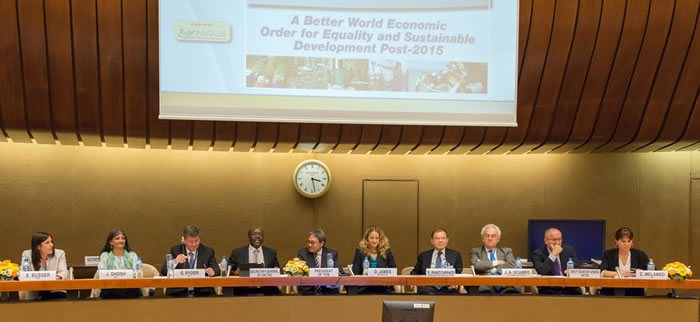Rising inequality is the result of policy choices and not an inevitable consequence of globalization, argued policymakers and experts on the first day of the UNCTAD Public Symposium in Geneva on 18 June.
The Symposium theme, a better world economic order for equality and sustainable development post-2015, marked the opening round table which looked at the macroeconomic dimensions of inequality.
"The new interconnected world offers immense hope, but has also brought with it immense imbalances," explained Dr. Mukhisa Kituyi, Secretary-General of UNCTAD.
Globalization and advances in technology have weakened the bargaining power of workers and increased the gap in income and wealth between the richest and the poorest, said economist Jayati Ghosh. Yet they are used as excuses to deflect attention from the lack of policy response from Governments.
Latin American and Asian countries have reduced inequality in recent years, Ms. Ghosh pointed out. The increased power of global financial markets made it more difficult for Governments to raise revenue or increase spending on public goods. However, Governments are trying to fend off these threats, "instead of collaborating to create an enabling international environment," she said.
Guy Ryder, Director-General of the International Labour Organization, said that policies that had not been pursued by Governments at the expense of economic growth included protection floors and a minimum wage. The wage share in national income has declined from 75 per cent to 65 per cent since the 1970s, he said. "If the main driver of economic growth is consumption then… the deficit in aggregate demand is linked to the stagnation of wages."
Under pressure from business and investors, Governments were not doing enough to raise the revenue to fund social protection, health care and other public goods argued Esther Busser of the International Trade Union Confederation.
 Panel at the Public Symposium (18 June, Geneva) |
Taxation systems are more regressive, corporate tax rates have declined and illicit financial flows are increasing, said José Antonio Ocampo, professor at Columbia University and former Minister of Finance of Colombia. Policy coordination is urgently needed to reduce the ability of big corporates to evade taxes, a trend that has a severe impact on public revenues.
Former UNCTAD Secretary-General Supachai Panitchpakdi stressed the importance of creating high quality jobs. In Africa, 70 per cent of workers are in the informal sector in insecure, low quality jobs. Social protection floors should not be used to make up for the lack of job creation in the formal sector, he said.
Turning to multilateral processes, Claire Melamed of the Overseas Development Institute warned against using the sustainable development goals to address all these issues. "Some of these issues may be better addressed by other institutions and other agreements," she said.
This is the fifth annual UNCTAD Public Symposium, which brings together external stakeholders from civil society and the private sector, parliamentarians, academics and other experts to debate critical issues in the global economy.
This year the Symposium, attended by some 300 participants, was part of a week of events to mark the fiftieth anniversary of UNCTAD. The issue of inequality and sustainable development was raised as far back as 1964, when UNCTAD member States spoke of persistent "extremes of wealth and poverty" as a major risk to development and peace.
UNCTAD research shows that the target of eradicating poverty by 2030 will not be met if inequality continues to widen.



